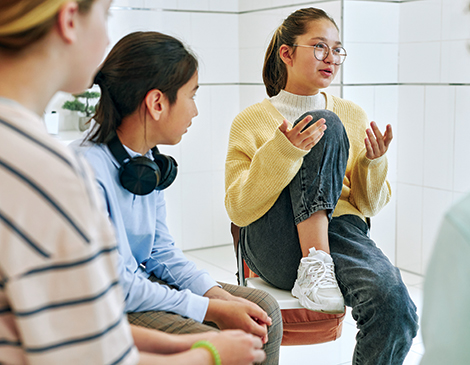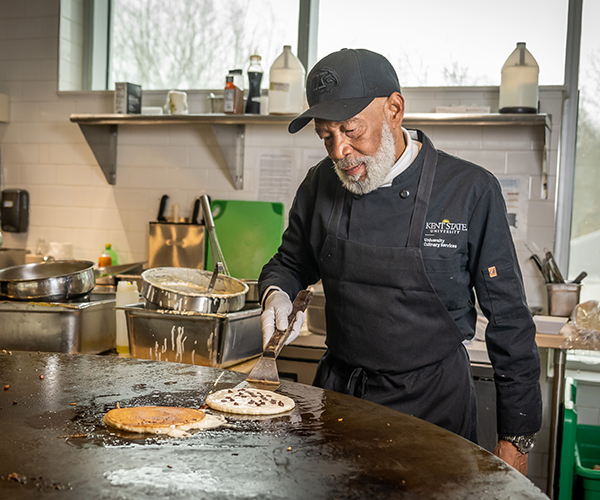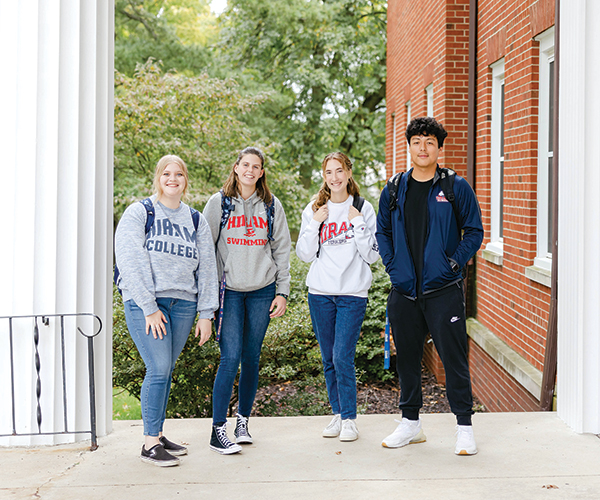There’s often a move. Then settling into a new home — establishing a family of friends. A once set schedule of school followed by perhaps sports, music or clubs has been reset.
“Traditional-aged college students are coming to live on their own for the first time and need to build that new support system on campus, and that can contribute to loneliness and social anxiety,” says Kate Hutson, Assistant Director for Substance Use Prevention & Recovery Services at Bowling Green State University.
Some lose coping skills. “They experience a change in the hobbies or activities or things they did at home to deal with stress,” she says.
It’s not just going-away-to-college stuff. It’s early adulthood and mounting responsibilities. “What our college students experience is not necessarily unique to them being at college,” says Dr. Talea Drummer-Ferrell, Kent State University’s associate vice president for student affairs and dean of students, overseeing counseling and psychological services.
Life changes. And changes can rock life.
“But now that students are part of this microcosm in college, we have worked hard to bring them the right resources at the right time,” she adds.
And students — people, in general — are ready to talk about mental health, although it’s not the new “friend” on campus, despite upticks during the pandemic. Healthy Minds Network reports that 22% of U.S. college students are diagnosed with severe depression. Mental health statistics collected during the pandemic from Best Colleges showed 45% of students feeling more anxious, and 36% feeling more irritable and depressed.
Certainly, there have been marked increases in anxiety and depression since March 2020, but also more education and awareness “in a way we haven’t seen before,” Drummer-Ferrell says. “Students, especially the younger generation, have taken off the veil and stigma of mental health. I personally love that our students want to talk about it more because it gives us an opportunity to provide resources and support them more.”
Here are ways that campuses are boosting mental health messaging and support so students of all ages and stages can thrive.
Continuing the conversation. Letting students know that support is available and guiding them to resources is not a “one-time conversation,” Drummer-Ferrell says. “We talk about it at orientation, but then they are overwhelmed, so to assume it’s one-and-done is not beneficial. Mental health is a constant conversation.”
For example, at Kent State, a series of mental health campaigns are sustaining the message. The school named October its mental health awareness month because of the traditionally large spike in demand for services at that time after students adjust to campus life. “We have an outwardly facing month of events, workshops, conversations and programs, including nominating a mental health champion who helps make a positive impact on our students every day,” she shares.
The school doubled its counseling center staff, and all eight campuses exchange ideas to deliver more information to students across the board. Other initiatives in the works to get resources in front of students as they journey through their college years include syllabus statements — a message faculty can embed in lectures.
Like other schools, the university is pulling this all together into a single source for students, accomplished with a dedicated website. At Kent, it will integrate with the existing Kent State of Well-Being portal focused on wellness and recreation, along with employee wellness. It’s about supporting the whole campus community, Drummer-Ferrell emphasizes.
Providing support spaces. Increasing access points to mental health support is a focus. BGSU has a drop-in support space model that includes belonging chats, body image talks and more. “We are expanding access to drop-in support spaces so students can do more than pick up the phone and schedule an appointment with counseling services,” Hutson says. “We are moving out into the campus community to meet students where they are.”
Students speaking up. “Getting the students to get to teach others is the key,” Drummer-Ferrell says, relaying a university wellness mantra: Flashes Take Care of Flashes. “I know when a student is having a difficult time at 11 p.m. they are not going to call our hotline right away. They’ll probably tell a friend. So, our job is to constantly inform our students.”
Currently, the university’s main campus is piloting an honors college program with peer ambassadors who train through ongoing workshops to serve as peer facilitators/counselors. She says, “We notice in this program where there is high pressure, perfectionism is an unspoken expectation and those students can become high-risk, so we want to make sure we have initiatives in place.”
Staying well. The mental health discussion must extend beyond, “I’m depressed. We want to talk about how to be proactive with our physical and mental health,” Drummer-Ferrell says.
Self-care is real.
And that can often mean connecting with peers who are walking through the same troubles. This is why Kent State has moved toward a step-care model that has significantly opened capacity at counseling services and basically triages students’ needs.
Some benefit more from a group experience. Others need one-on-one guidance. There are students who want to help facilitate groups and access training. And there are some needs that cannot be accommodated on campus and require emergency intervention, which is why the university maintains close ties with area hospitals and providers.
Drummer-Ferrell says, “All of this helps us make sure we get the right students the right resources at the right time.”
A parent’s part. Check in, early and often, and always. Of course, there is a balance as a young-adult child explores independence and the college environment. “Just make sure your student knows you are available to talk, and directly ask about how they are coping with the transition — that can start a conversation,” Hutson says.
As a parent, stay informed. Visit the campus counseling center’s website and learn about available resources. Find out about programming. Hutson says, “The more parents know about what’s going on at campus, they can point to resources that might be useful to their students.”
Get ahead of the weekend by signing up for our free weekly “In the CLE” newsletter — your guide to fun throughout The Land. Arriving in your inbox every Wednesday, this weekend to-do list fills you in on everything from concerts to museum exhibits — and more. Click here to subscribe.




